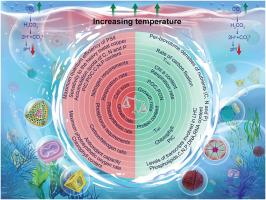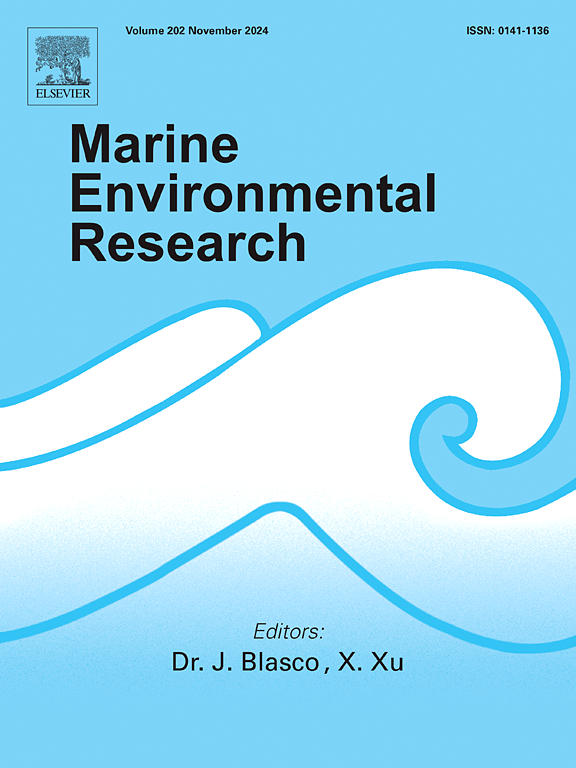The trade-offs associated with the adaptions of marine microalgae to high CO2 and warming
IF 3
3区 环境科学与生态学
Q2 ENVIRONMENTAL SCIENCES
引用次数: 0
Abstract
Trade-offs play vital roles in evolutionary theory, linking organism performance to changing environments in the context of global change. Marine microalgae, as one of the most important groups of primary producers in the biosphere, exhibit significant trade-offs across multiple traits in response to environmental changes, such as elevated CO2 (and consequent ocean acidification) and warming. In this review, we synthesize recent findings on the trade-offs associated with both short-term phenotypic acclimation and long-term genotypic adaptation of marine microalgae. Specifically, we discuss distinct classes of trade-offs (i.e., allocation trade-offs, acquisition trade-offs and specialist-generalist trade-offs) between multiple traits, such as growth rate, photosynthesis, nutrient acquisition, and stress tolerance. We also explored the underlying mechanisms driving these trade-offs. Finally, we discuss the broader ecological consequences of these trade-offs, such as potential shifts in species composition and ecosystem functions, and outline key research directions to better predict marine ecosystem responses to future global change scenarios.

海洋微藻类适应高二氧化碳和气候变暖的利弊权衡。
权衡在进化理论中起着至关重要的作用,它将生物体的表现与全球变化背景下不断变化的环境联系在一起。海洋微藻作为生物圈中最重要的初级生产者群体之一,在应对二氧化碳升高(以及随之而来的海洋酸化)和气候变暖等环境变化时,在多个性状上表现出显著的权衡。在这篇综述中,我们将综述与海洋微藻短期表型适应和长期基因型适应相关的最新研究成果。具体而言,我们讨论了生长率、光合作用、营养获取和抗逆性等多个性状之间不同类别的权衡(即分配权衡、获取权衡和专一-综合权衡)。我们还探讨了驱动这些权衡的潜在机制。最后,我们讨论了这些权衡带来的更广泛的生态后果,如物种组成和生态系统功能的潜在变化,并概述了更好地预测海洋生态系统对未来全球变化情景的响应的关键研究方向。
本文章由计算机程序翻译,如有差异,请以英文原文为准。
求助全文
约1分钟内获得全文
求助全文
来源期刊

Marine environmental research
环境科学-毒理学
CiteScore
5.90
自引率
3.00%
发文量
217
审稿时长
46 days
期刊介绍:
Marine Environmental Research publishes original research papers on chemical, physical, and biological interactions in the oceans and coastal waters. The journal serves as a forum for new information on biology, chemistry, and toxicology and syntheses that advance understanding of marine environmental processes.
Submission of multidisciplinary studies is encouraged. Studies that utilize experimental approaches to clarify the roles of anthropogenic and natural causes of changes in marine ecosystems are especially welcome, as are those studies that represent new developments of a theoretical or conceptual aspect of marine science. All papers published in this journal are reviewed by qualified peers prior to acceptance and publication. Examples of topics considered to be appropriate for the journal include, but are not limited to, the following:
– The extent, persistence, and consequences of change and the recovery from such change in natural marine systems
– The biochemical, physiological, and ecological consequences of contaminants to marine organisms and ecosystems
– The biogeochemistry of naturally occurring and anthropogenic substances
– Models that describe and predict the above processes
– Monitoring studies, to the extent that their results provide new information on functional processes
– Methodological papers describing improved quantitative techniques for the marine sciences.
 求助内容:
求助内容: 应助结果提醒方式:
应助结果提醒方式:


